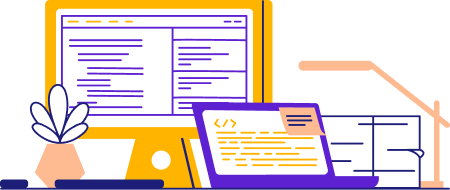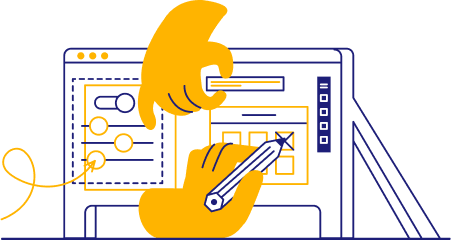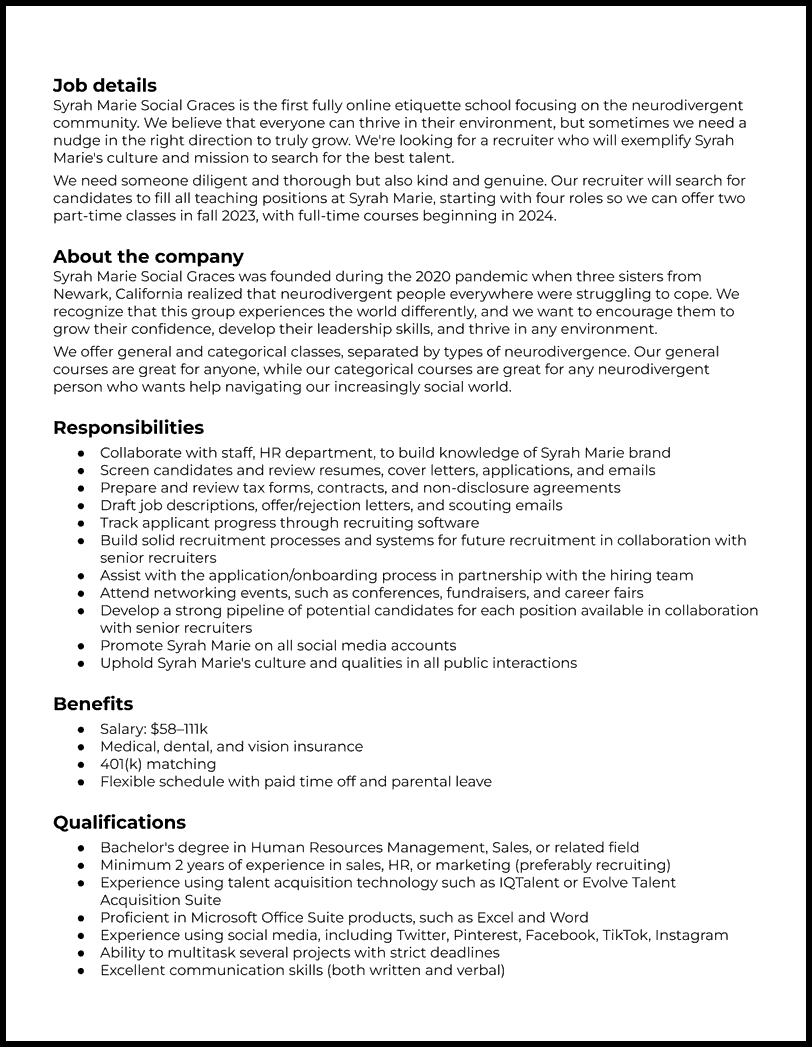Searching for a sharp recruiter but not convinced you need one in the first place?
According to Forbes, exceptional recruiters are the ones who “realize that the battle is won in the trenches, in which every conversation with a candidate can lead to a return on investment.” Masters of finding talent, they’re the gatekeepers who open the door to all your future employees.
BeamJobs knows that finding Mr. or Mrs. Right Recruiter and giving them so much responsibility can be scary, but rest assured, we’ve made the process painless!
By following our recruiter job description guide, complete with examples, outlines, and advice, you’ll have top-notch candidates directing their recruiter resumes and recruiter cover letters your way in a hurry.
Writing a Clear, Compelling Recruiter Job Description

Job descriptions should represent your company well and encourage applications. More often, though, they’re confusing, overwhelming, or just plain boring. No matter how many fancy job ads you crank out, recruiters will notice if your job description is poorly written. That’s why we at BeamJobs do what we do, so your job description can shine!
More than just being well-written, job descriptions should be fun. At BeamJobs, we love writing job descriptions that meet every requirement without sacrificing personality. We make ours informative and engaging, even for technical positions. Recruiters especially appreciate entertaining job descriptions because they’re strong communicators who excel at engaging their audience, not to mention they’ll know how to tailor their recruiter cover letters.
When it comes to writing such amazing job descriptions, we know it can feel impossible. No worries—we’ve got the writing process covered!

Identify your needs and deliver
Like the recruitment process, writing a great job description goes in stages. The first step is to identify your company’s needs, your applicants, and your future hires.
Identifying your company’s biggest need means figuring out why you’re hiring. Are you spending hours and countless resources searching out talent for your growing company? Are you fighting against a high turnover rate because of poor hiring processes and training? Establish who you’re hiring and why you’re hiring for that role.
The next step is filling in our handy outline: your recruiter’s daily tasks, the credentials required for the position, and what perks the company offers. Talk to employees within your company to make it detailed while still concise.

Take it a step further by revising
Once everything is filled in, it can be tempting to submit it and be done. You’re a good communicator, so you’ve already done a good job. But there’s a gap between good work and great work. That gap is filled by revision.
Have you accomplished all the goals you set out to fulfill? Did you leave anything out? Trent University explains revision as the time to “re-envision” your piece. You’ll also need to catch any typographical or grammatical errors. We all make minor mistakes, but when those mistakes add up, they can cost you your professional reputation.
So, cut out filler. Shorten your sentences. Brighten up your word choice. Make sure you’ve covered everything the applicant needs to know without overwhelming them.
Then you should consider your writing’s tone. Your job description should reflect the personality of recruiters; it should be professional, personable, and practical, in addition to being well-written.
If you’re not sure about your tone, that’s okay—this step is all about getting feedback from the hiring team. Hand it off to your co-workers and ask for constructive criticism (while you take a well-needed break). Once you’re refreshed, come back and review their edits, making the necessary changes.
The last step is reviewing your formatting. It might look perfect in your word processor, but each job board formats descriptions differently. You’ll need to evaluate the formatting per website.
Then, all you need to do is inform HR about the flood of recruiter resumes you’ll soon receive!
Begin Your Recruiter Job Description with This Outline

Feeling stuck? We’ve been there. Use this outline to structure your job description to perfection!

Job details
Recruiters know making a good impression immediately is crucial, so don’t neglect this introduction. Here, you’ll introduce the job, the company, and why you’re hiring. Make it brief but don’t sacrifice personality. Humor is a great way to get applicants interested right from the start.

About the company
It’s important to know about the company, but paragraphs and paragraphs about your company’s achievements or history will bore your readers. Give some general facts, a bit of your mission statement, and some personal flair for a perfect “about us” section.

What you’ll be doing
Recruiters know their job is to get talent in the door, but what else do you require? This section should overview your future recruiter’s daily tasks without getting too detailed. The goal is to strike a balance between general and specific. If you’re too specific, it sounds overwhelming and bossy. If you’re too vague, it becomes generalized and boring. Take a look at some of our examples below to find that sweet spot.
- Build a strong pipeline of potential candidates for each position available
- Advocate for Aerrow and clients on social media and email campaigns

Qualifications
Recruiting qualifications can sound like a broken record—most recruiters do the same thing no matter the company. But keep in mind that your recruiter needs to represent your unique company well so they should be uniquely qualified. Be precise and establish some of the goals you hope to achieve, but remember you don’t need to do so for every bullet point.
- Bachelor’s degree in Human Resources Management, Sales, or related field
- Minimum 3 years experience as a technical recruiter, preferably within the aerospace industry
- Demonstrated success filling client positions with candidates from pipeline

Benefits
This is the dessert section of your job description, so don’t put it before the meat and potatoes (your requirements and qualifications). It’s still important since it can help entice applicants, but keep it short and specific. Make sure to add some fun perks if you have them—some good ideas include gym memberships, discounts on merchandise, or company culture activities (We love Food Truck Fridays).
Recruiter Roles and Responsibilities

Recruiters straddle the line between the public and the company to ensure the appropriate personnel fills the roles. They take on a lot of responsibility to make sure they represent the company well, achieve its hiring goals, and keep the new employees happy.
If you need some help defining the role of a recruiter, look no further than this list. Not all recruiters will fulfill all of these functions, but it’s a good general overview of a recruiter’s job.

Public communicator
- A recruiter’s entire job is based on communication. They can communicate efficiently with anyone, no matter the situation and are constantly writing or talking to many people—they negotiate, soothe, inform, encourage, and advise.
- Conduct cold calls, interview candidates, present data, and interact with potential applicants, making sure to analyze body language and non-verbal cues to evaluate audience engagement.
- Write engaging, creative emails, job descriptions, job advertisements, social media copy/comments, job offer/rejection letters, and speeches.
- This role will require strong verbal and written communication skills. Must have a confident, friendly manner and good presentation skills.

Technology expert
- Just like other positions in HR, recruiters use software to increase their productivity and efficiency.
- According to Human Resource Executive, adding technology has helped so much that some applicants felt they received feedback too quickly. Needless to say, technology has greatly improved the recruiting process, and recruiters need to use those tools effectively.
- Utilize PinPoint to post to job boards, refer employees, schedule interviews, and interview candidates.
- Utilize Loxo to draft emails and social posts, make calls, screen candidates, and track sales pipeline activity.
- This role will require at least 2 years of prior experience using ATS and CRM software, along with proficiency in Microsoft Office Suite technology.

Salesperson
- Recruiting is essentially another form of sales. The recruiter markets the company and the position to the applicant, and the applicant markets their skills and qualifications to the company. So, it stands to reason that recruiters must be excellent salespeople.
- Learn the intricacies of each position, write compelling job descriptions/advertisements, establish trustworthy relationships with applicants, answer applicant questions, evaluate hiring needs, and build a strong talent pipeline.
- This role will require superior verbal and written communication skills, including negotiation and mediation. Must also have a friendly, trustworthy demeanor and high emotional intelligence.

Visionary
- If there’s one thing recruiters should never do—it’s remain static. Recruiters work with people, which makes their job inherently dynamic. This means recruiters need to monitor their methods constantly. They should also suggest improvements to the hiring process, and the company’s overall functioning to make sure everything runs as smoothly as it should.
- Establish positive relationships with each candidate, clarify the company’s hiring goals with each applicant, and request feedback to identify gaps/errors in the hiring process.
- Using candidate feedback, develop an efficient and nurturing hiring process in collaboration with HR, the marketing team, relevant executives, and the department in which the new hire will work.
- This role will require excellent written, verbal, and interpersonal skills. Must also be a creative, critical thinker who can multitask in a group setting or independently.

Advisor
- Recruiters are more than just data-driven workers who fill vacancies; according to talent acquisition expert Jeremy Eskenazi, they must “consult and advise on the best ways to bring in the right talent.” They are responsible for the overall hiring process and should be able to guide the hiring team to the best candidates. There is no passivity in a recruiter’s role as an advisor.
- Collaborate with the hiring team to clarify hiring expectations, cement the hiring process schedule, and establish the roles and responsibilities of the new employee. Throughout the process, update and advise the hiring team on progress.
- Establish trustworthy relationships with each candidate and request feedback to convey to the hiring team.
- This role will require strong verbal communication and organizational skills. Must also be confident and able to adapt to any situation.

Administration
- As mentioned previously, a recruiter’s job is based on all forms of communication, including paperwork and other administrative duties. They handle a high volume of applications, resumes, and other candidate documentation, so they must be efficient and highly organized.
- Draft application documents, such as job applications, descriptions, or advertisements.
- Update company records and candidate documentation, including contact lists, throughout the hiring process.
- Maintain the calendar and schedule interviews, calls, and meetings.
- This role will require excellent organizational, written, and verbal communication skills, and the ability to multitask independently.

Project manager
- As you can probably tell, recruiters navigate the entire hiring process, which means they take on the unspoken mantle of “project manager.” They spearhead the hiring operation from beginning to end, ensuring that everyone is content with the outcome (while also meeting the company’s hiring goals).
- Establish hiring expectations, coordinate hiring timeline, and schedules, mitigate disagreements, obtain all necessary materials, and ensure candidate and overall quality of the hiring process.
- This role will require sharp interpersonal and leadership skills, adaptability, and the ability to multitask various projects.








